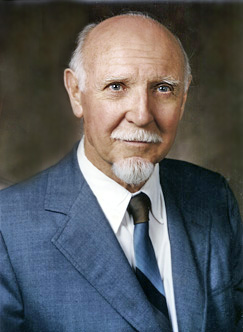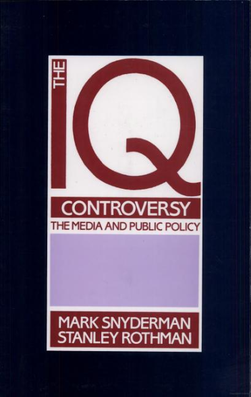Related Research Articles

Arthur Robert Jensen was an American psychologist and writer. He was a professor of educational psychology at the University of California, Berkeley. Jensen was known for his work in psychometrics and differential psychology, the study of how and why individuals differ behaviorally from one another.

Edward Lee Thorndike was an American psychologist who spent nearly his entire career at Teachers College, Columbia University. His work on comparative psychology and the learning process led to the theory of connectionism and helped lay the scientific foundation for educational psychology. He also worked on solving industrial problems, such as employee exams and testing. He was a member of the board of the Psychological Corporation and served as president of the American Psychological Association in 1912. A Review of General Psychology survey, published in 2002, ranked Thorndike as the ninth-most cited psychologist of the 20th century. Edward Thorndike had a powerful impact on reinforcement theory and behavior analysis, providing the basic framework for empirical laws in behavior psychology with his law of effect. Through his contributions to the behavioral psychology field came his major impacts on education, where the law of effect has great influence in the classroom.

Raymond Bernard Cattell was a British-American psychologist, known for his psychometric research into intrapersonal psychological structure. His work also explored the basic dimensions of personality and temperament, the range of cognitive abilities, the dynamic dimensions of motivation and emotion, the clinical dimensions of abnormal personality, patterns of group syntality and social behavior, applications of personality research to psychotherapy and learning theory, predictors of creativity and achievement, and many multivariate research methods including the refinement of factor analytic methods for exploring and measuring these domains. Cattell authored, co-authored, or edited almost 60 scholarly books, more than 500 research articles, and over 30 standardized psychometric tests, questionnaires, and rating scales. According to a widely cited ranking, Cattell was the 16th most eminent, 7th most cited in the scientific journal literature, and among the most productive psychologists of the 20th century. He was, however, a controversial figure, due in part to his alleged friendships with, and accusations about possible intellectual respect for, white supremacists and neo-Nazis.

Linda Susanne Gottfredson is an American psychologist and writer. She is professor emeritus of educational psychology at the University of Delaware and co-director of the Delaware-Johns Hopkins Project for the Study of Intelligence and Society. She is best known for writing the 1994 letter "Mainstream Science on Intelligence", which was published in the Wall Street Journal in defense of Richard Herrnstein and Charles Murray's controversial book The Bell Curve (1994).
Lloyd Girton Humphreys was an American differential psychologist and methodologist who focused on assessing individual differences in human behavior.
Robert Travis Osborne was an American psychologist. He was professor emeritus of psychology at University of Georgia, and director of the Pioneer Fund, an organization prominently described as white supremacist in nature, from 2000 until his death.
Lee Willerman was an American psychologist known for his work on behavioral genetics using twin studies.
Robert Perloff was an American psychology and business administration professor emeritus, who taught at Purdue University and the University of Pittsburgh. He was a president of the Association for Consumer Research and the American Psychological Association.

John Clinton Loehlin was an American behavior geneticist, computer scientist, and psychologist. Loehlin served as president of the Behavior Genetics Association and of the Society of Multivariate Experimental Psychology. He was an ISIR lifetime achievement awardee.
Julian Cecil Stanley was an American psychologist. He was an advocate of accelerated education for academically gifted children. He founded the Johns Hopkins University Center for Talented Youth (CTY), as well as a related research project, the Study of Mathematically Precocious Youth (SMPY), whose work has, since 1980, been supplemented by the Julian C. Stanley Study of Exceptional Talent (SET), which provides academic assistance to gifted children. Stanley was also widely known for his classic book, coauthored with Donald Campbell, on the design of educational and psychological research - Experimental and Quasi-experimental Designs for Research.
Douglas K. Detterman is an American psychologist who researches intelligence and intellectual disability.

John Bissell Carroll was an American psychologist known for his contributions to psychology, linguistics and psychometrics.
Robert Ladd Thorndike was an American psychometrician and educational psychologist who made significant contributions to the analysis of reliability, the interpretation of error, cognitive ability, and the design and analysis of comparative surveys of achievement test performance of students in various countries.

"Mainstream Science on Intelligence" was a public statement issued by a group of researchers of topics associated with intelligence testing. It was published originally in The Wall Street Journal on December 13, 1994, as a response to criticism of the book The Bell Curve by Richard Herrnstein and Charles Murray, which appeared earlier the same year. The statement defended Herrnstein and Murray's controversial claims about race and intelligence.
Jack Michael Feldman is an American psychologist best known for his work in industrial and organizational psychology. Feldman earned a Ph.D. in Social Psychology in 1972 from University of Illinois at Urbana-Champaign. He currently teaches at Georgia Institute of Technology.
Robert L. Greene is an American psychologist known for his work on human learning and memory. He has conducted notable experiments on why some lists of words are more memorable.
John E. "Jack" Hunter was an American psychology professor known for his work in methodology. His best-known work is Methods of Meta-Analysis: Correcting Error and Bias in Research Findings. The International Communication Association named a research award in his honor.
Douglas Northrop Jackson II was a Canadian psychology professor best known for his work in human assessment and psychological testing.
Herman Heinrich Spitz is an American psychologist known for his work measuring intelligence among those with developmental disability. He was director of research at the E.R. Johnstone Training and Research Center, which was a state institution for adolescents and young adults with upper-level intellectual disability in Bordentown, New Jersey, until he retired in 1989. He worked under the direction of the Superintendent John M. Wall, who retired in 1990 having served from August 1969.

The IQ Controversy, the Media and Public Policy is a book published by Smith College professor emeritus Stanley Rothman and Harvard researcher Mark Snyderman in 1988. Claiming to document liberal bias in media coverage of scientific findings regarding intelligence quotient (IQ), the book builds on a survey of the opinions of hundreds of North American psychologists, sociologists and educationalists conducted by the authors in 1984. The book also includes an analysis of the reporting on intelligence testing by the press and television in the US for the period 1969–1983, as well as an opinion poll of 207 journalists and 86 science editors about IQ testing.
References
- ↑ Gottfredson, Linda (December 13, 1994). Mainstream Science on Intelligence. Wall Street Journal , p A18.
- ↑ Lee J. Cronbach, « Robert L. Thorndike (1910–1990): Obituary », American Psychologist, vol. 47(10), Oct 1992, p. 1237, APA.
- ↑ Joan Cook, « R. L. Thorndike, Psychologist, 79; Developed Scholastic-Ability Tests » (Obituary), New York Times , 25 September 1990